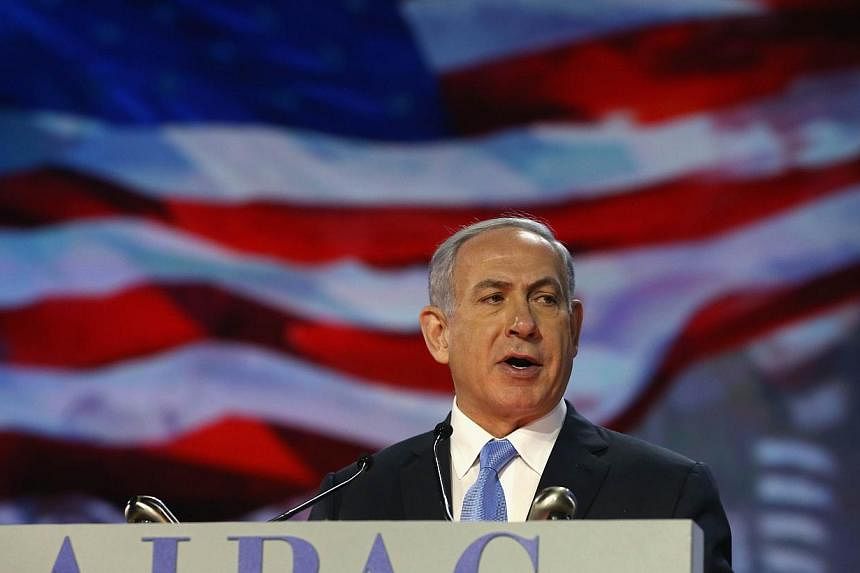WASHINGTON (BLOOMBERG) - Israeli Prime Minister Benjamin Netanyahu said he will tell the United States Congress that he has "a moral obligation to speak out" against an Iranian regime that threatens to destroy Israel.
"The days when the Jewish people are passive to the threats of annihilators - those days are over," the Israeli leader told the American Israel Public Affairs Committee in Washington on Monday. He said the US disagrees with Israel on how to stop Iran from obtaining a nuclear weapon.
The speech provided a preview of an address Netanyahu will deliver to a joint session of Congress on Tuesday, where he will explain why he's trying to sink a potential Iran nuclear deal in a direct challenge to President Barack Obama. The Israeli leader accepted an invitation to speak from Republican House Speaker John Boehner without consulting the White House, a move that U.S. National Security Adviser Susan Rice has called "destructive".
Netanyahu told Aipac that his speech to Congress isn't intended "to show any disrespect to President Obama or the esteemed office that he holds. I have great respect for both".
He said "reports of the demise of the U.S.-Israeli relationship are not only premature, they're just wrong."
Netanyahu knows enough about compromises that have been made in negotiations between Iran and world powers to conclude that a deal would threaten the Jewish state's security, according to an official travelling with the prime minister who asked not to be named because of the trip's diplomatic sensitivity.
The prime minister will tell lawmakers how the evolving accord falls short, the official said, urging them to press for a delay in a deadline at the end of this month to agree on the framework for a deal and to change an eventual agreement if they aren't satisfied with it, the official said.
Obama administration officials have said any attempt by Congress to intervene would wreck chances for an accord, and the president would veto such a measure.
"We are concerned by reports that suggest selective details of the ongoing negotiations will be discussed publicly in the coming days," Secretary of State John Kerry told reporters today in Geneva. "I want to say clearly that doing so would make it more difficult to reach the goal that Israel and others say they share in order to get a good deal."
A bipartisan group of senators introduced legislation last week that would give Congress the power to review any agreement that the US and five other nations reached with Iran to curb its nuclear program in exchange for easing economic sanctions.
The measure offered by Robert Corker of Tennessee, the Republican chairman of the Senate Foreign Relations Committee, and Robert Menendez of New Jersey, the committee's top Democrat, would delay any easing of sanctions on Iran for as long as 60 days. Under the bill, sanctions relief would remain prohibited if Congress voted against an Iran agreement and then overrode an expected veto by the president within the 60 days.
Netanyahu's opponents in Israel have said his Washington trip is aimed at bolstering his standing before Israelis vote March 17 whether to give him a fourth term, and the White House has said Obama won't see him during this visit because it's so close to election day.
Military Option Netanyahu in the past has threatened Israeli airstrikes to thwart Iran, though it would take US military capabilities to do more than delay an Iranian effort to develop nuclear weapons.
The US and allies say Iran is seeking the capability to build nuclear weapons. The Islamic Republic says its programme is purely for peaceful, civilian purposes.
In Geneva, Kerry took an opportunity to showcase US support for Israel, defending it before a UN group that's often hostile to the Jewish State.
Kerry told a conference of the UN Human Rights Council, the world body's top human rights group, that its "obsession with Israel actually risks undermining the credibility of the entire organization".
"We will oppose any effort by any group or participant in the UN system to arbitrarily and regularly delegitimise or isolate Israel, not just in the HRC but wherever it occurs," he said.

